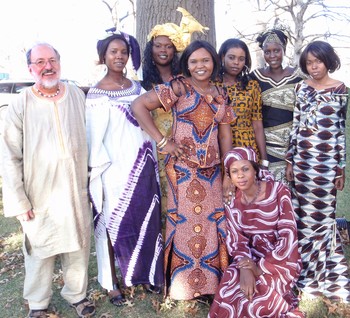With a congregation whose population is 95 percent Sudanese refugees, Cottage Grove Presbyterian Church in Des Moines, Iowa, might seem different from the average church in the Presbyterian Church (U.S.A.).
But step into Cottage Grove’s kitchen and you’ll find a scene common to many churches: the preparations for a communal meal.
“Music and worship are the centerpiece (at Cottage Grove),” said the Rev. David Madsen, pastor. But “next to music, food and fellowship is extremely important.”
And while the offerings at the meals might be foreign to many Americans — raw sheep stomach and liver dipped in a peanut/pancreatic fluid mixture is often on the menu — the sense of faith and family present at the meals is universal, Madsen said.
While Cottage Grove was already a multicultural congregation, its Sudanese population began increasing in 1993 with the arrival of thousands of Sudanese refugees who resettled in Des Moines. Madsen got a call from a local nun who had been working with several Sudanese refugees who were worshiping at a Catholic church. But because of the history of Presbyterian mission in Sudan, the refugees were Presbyterian and were looking for a new church home. When the nun brought 12 refugees to Cottage Grove, “we were off and running,” Madsen said.
Cottage Grove is now known as the “Sudanese hometown” in Des Moines and serves as a community center as well as a church. Every Sunday, worship is held in three languages — English, Arabic and Mabaan. The Sudanese members also host tribal meetings, birthday parties and funerals for family members and friends who have died in Africa.
The Sudanese members are very connected to their extended families — everyone is a cousin, Madsen said. This sense of community is different from the American emphasis on individualism, he said, adding that the Sudanese believe that if the community thrives, its members will too.
“I find (that perspective) to be, in many ways, more Christian than our individualistic approach,” Madsen said, adding that the “frozen chosen” label often applied to Presbyterians doesn’t fit the Sudanese, whose faith is exuberant and enthusiastic.
All of the large gatherings at the church involve food, often leading the chefs to cook all night. They bring in mattresses for their children, who sleep in the kitchen while their parents cook.
“We just work all night. That’s not including shopping and slaughtering,” said Ekram Kachu, a student at the University of Dubuque Theological Seminary and Cottage Grove’s head chef.
The kind of food that will be served depends on which regions of Sudan will be represented at a gathering, she said, adding that she never knows how many people she’ll be cooking for, as friends and neighbors often show up unannounced.
In February 2013, the Travel Channel’s Bizarre Foods TV show visited Cottage Grove to explore how Sudanese meals are served in the Midwest. Kachu was excited to share her story for a wider audience.
“I’m so proud of my community and my culture and my food and also to show being Presbyterian,” she said.
To watch the Bizarre Foods clip featuring Cottage Grove Presbyterian Church, click here.

